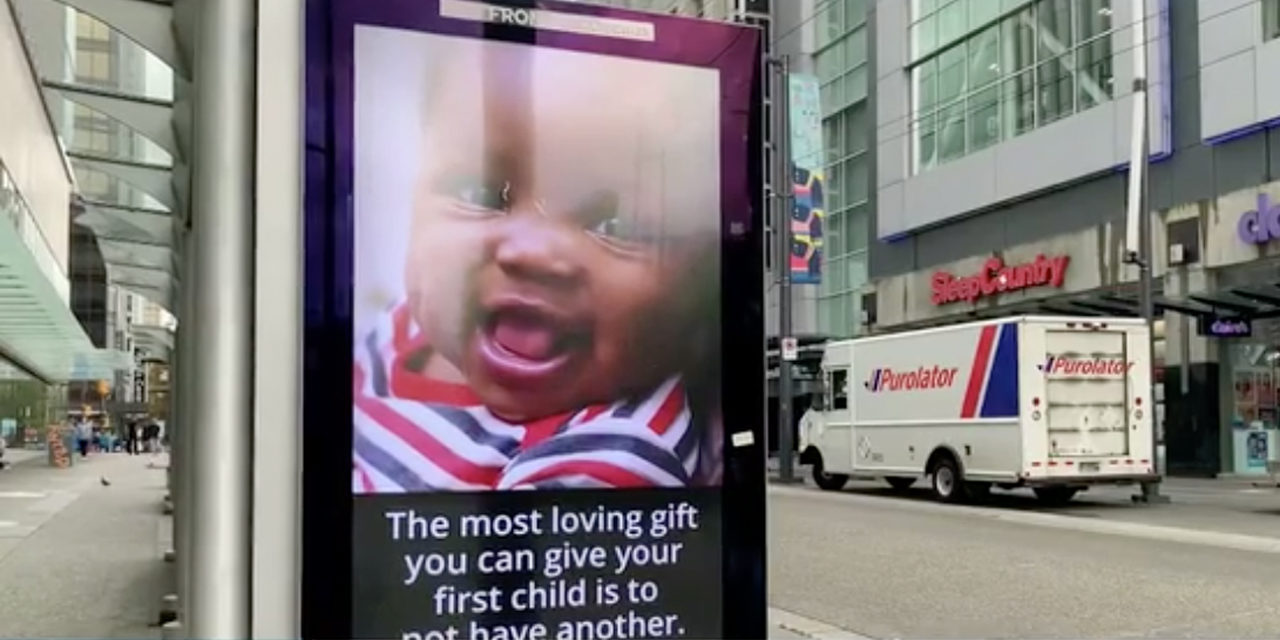Motorists around the city of Vancouver, Canada have been subjected to an advertisement that tells couples “The most loving gift you can give your first child is to not have another.”
The ad is part of a “One Planet, One Child” campaign, designed by World Population Balance. The group’s Facebook page says it works to “alert people to the overpopulation crisis and celebrates the choice to have a small family, (as) small families are helping to create a healthy planet, better lives and a promising future.”
The overall emphasis encourages families to “think small,” with billboards and transit ads like “Conservation begins at contraception” and “Traffic congestion begins at conception.”
“People have avoided the subject of overpopulation for so long and there really isn’t widespread knowledge that we have a human population crisis,” executive director Dave Gardner said in an interview with Freshdaily. “We’re confident that if people know the facts, they’ll be a lot more comfortable talking about it and addressing it. We really can solve that part of the sustainability problem that doesn’t have to take hundreds of years and the solution is ethical.”
It’s part of a growing movement of radical conservationists and environmental activists who don’t want to have children because of concerns that the earth is overpopulated.
In 2018, The New York Times ran an article discussing how many Millennials were deciding not to have children solely due to concerns over the future of the planet.
“Animals are disappearing. The oceans are full of plastic. The human population is so numerous, the planet may not be able to support it indefinitely,” Amanda PerryMiller, a mother of two, told the Times. “This doesn’t paint a very pretty picture for people bringing home a brand-new baby from the hospital.”
“I’m so glad I’m not going to bring a brand-new baby into this world to suffer like these kids suffer,” Cate Mumford said.
These alarmists are missing something incredibly important—life and family is more likely to help “save” the planet than avoiding having children at all. In fact, underpopulation is becoming an issue around the globe.
Already, the World Bank has reported that between 1960 and 2016, the world’s fertility rate fell by more than 50%. This is happening mostly in the developed world, as industrialization and modernization has resulted in couples having fewer children.
Japan is a prime example. Reports indicate that by 2036, one in three people in the country will be elderly, which will result in a severe work shortage that could make economic growth stagnant or essentially nonexistent. The Japanese government has tried various measures to encourage couples to have more children, but these measures have yet to have positive results.
Environmentalists may celebrate that, but who’s to say that the youngest child in a family of six won’t be the one who finally creates a sustainable, renewable energy source or cleans up the oceans? It is important that humanity be good stewards of the environment but encouraging couples to have small families or no family at all is not the way to go about it.
Related articles and resources:
Christians and the Environment
How Fertility Drives the Health of Nations
Is Too Many or Too Few Babies the Real Problem in the World Today?
Seven Billion and Counting: How Many Is Too Many?
Screenshot from CityNews
Visit our Election 2020 page






